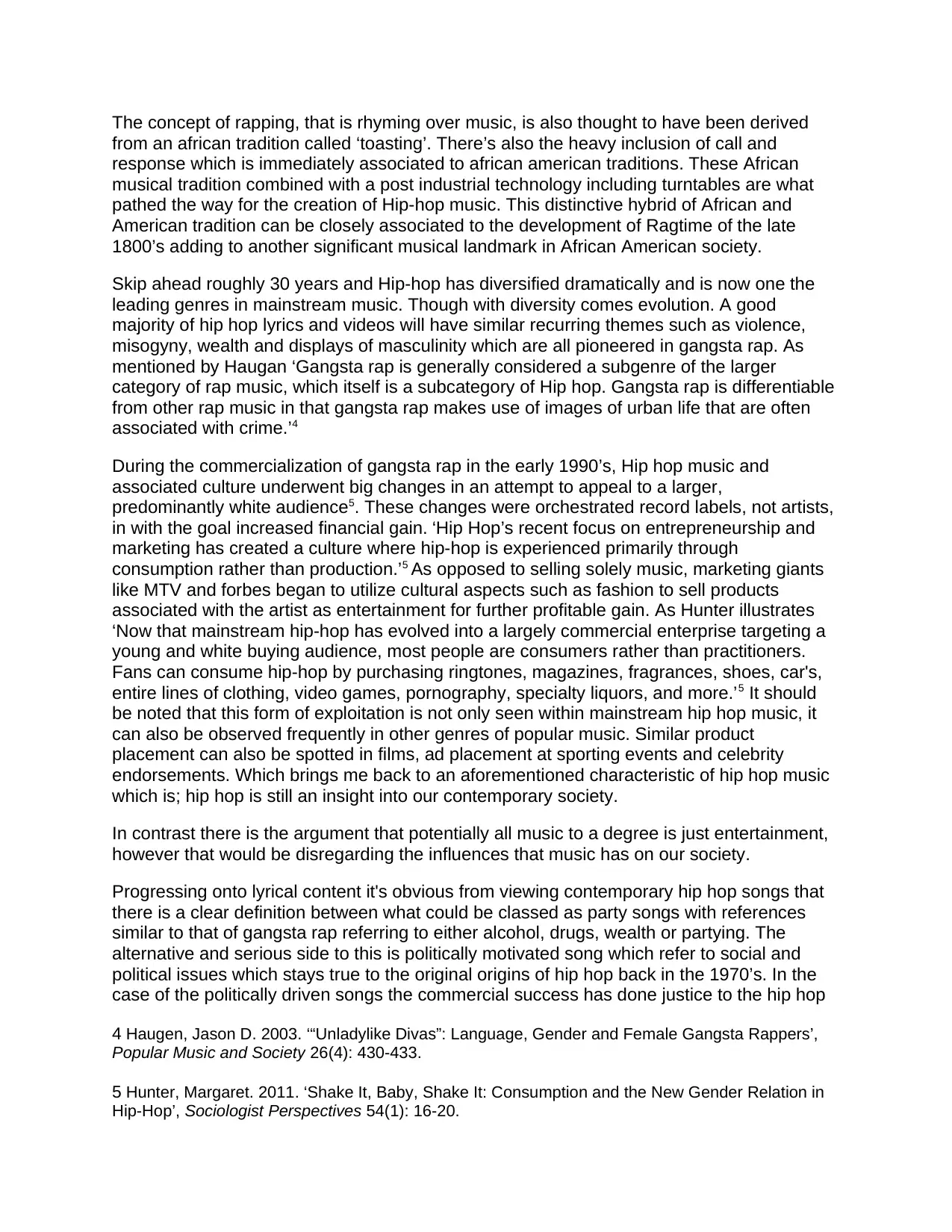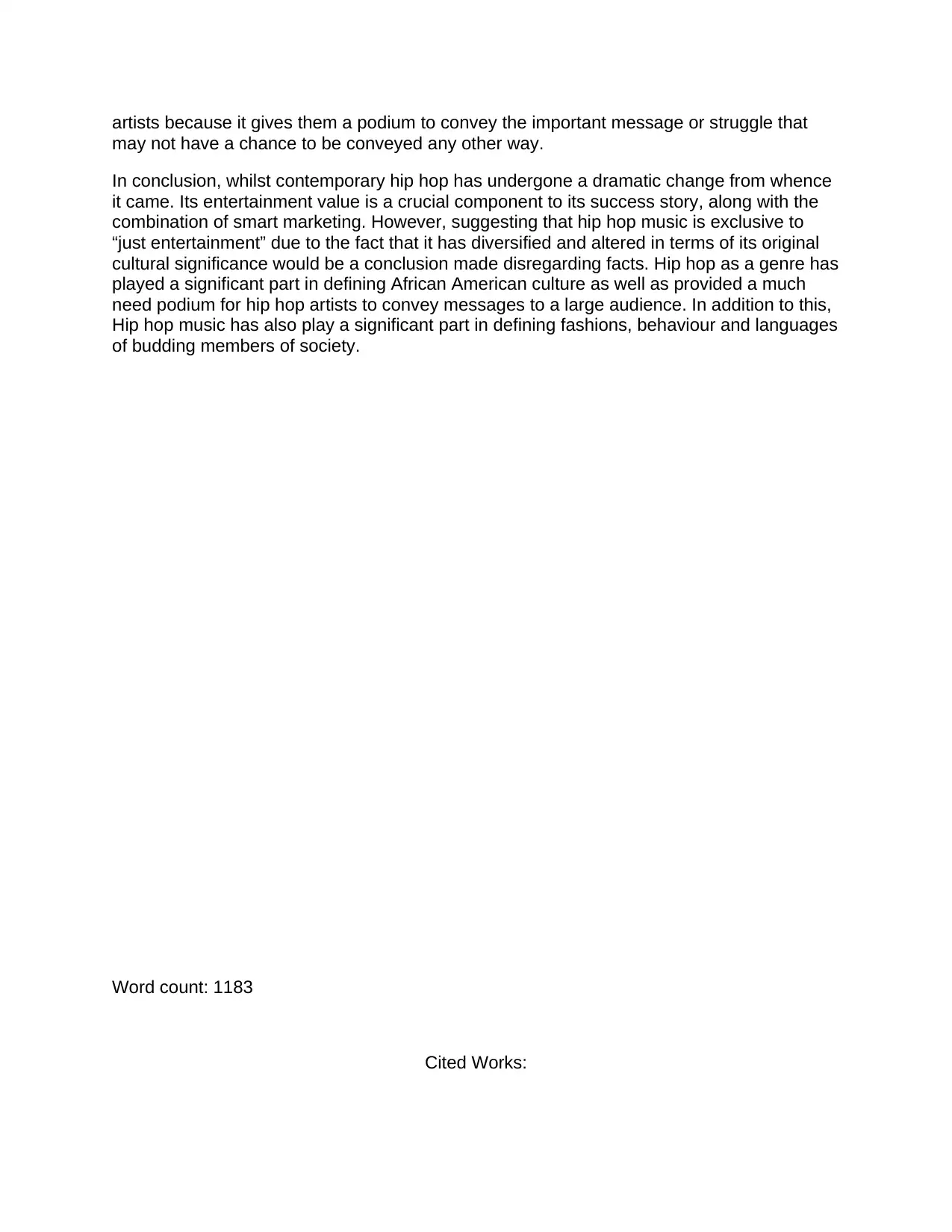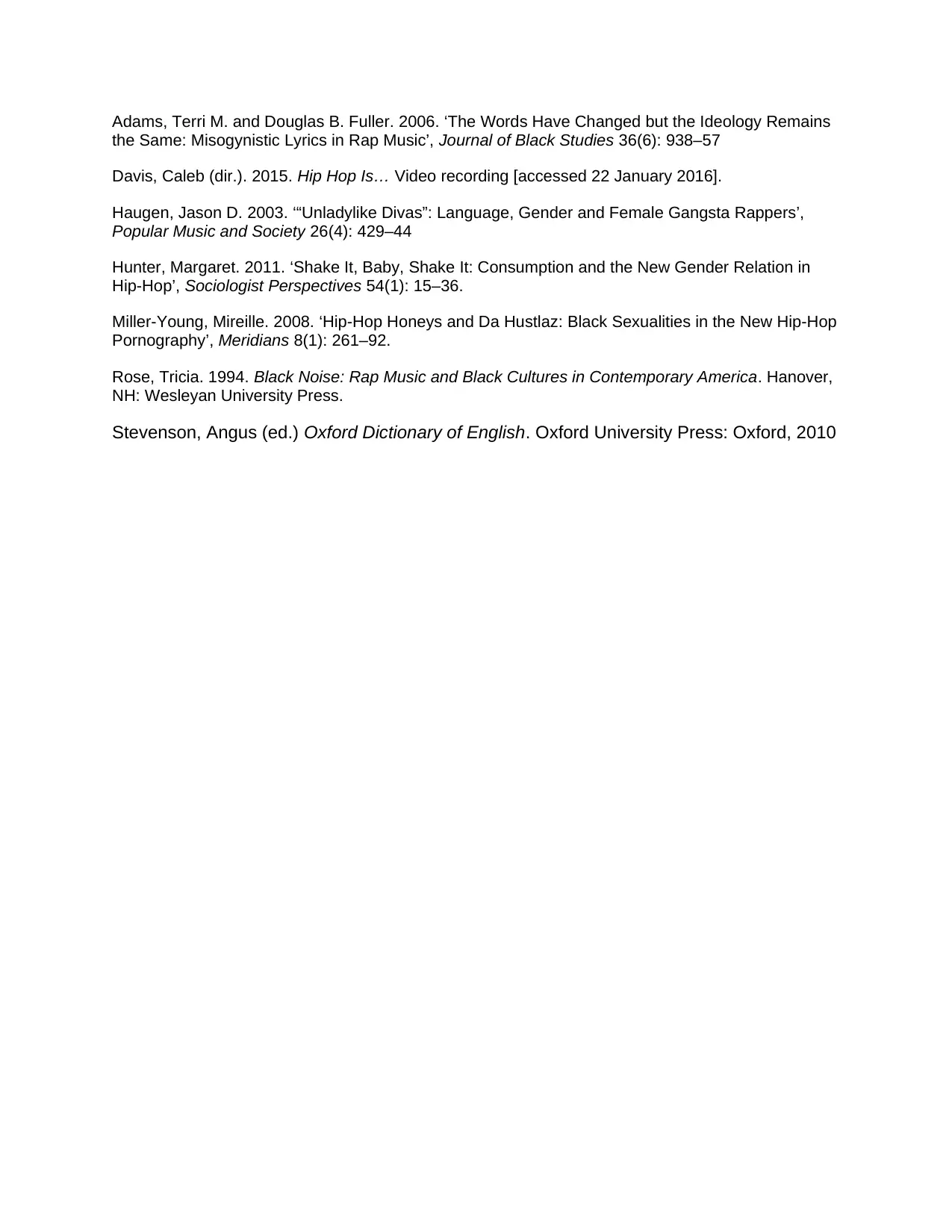Hip-Hop Music: Entertainment, Society, and Politics Essay Example
VerifiedAdded on 2020/09/08
|4
|1529
|101
Essay
AI Summary
This essay explores the complex relationship between hip-hop music, society, and politics, arguing that hip-hop is not 'just entertainment'. It defines entertainment and then examines hip-hop's origins in the South Bronx, highlighting its role as a voice for marginalized communities and a counter to street gang culture. The essay traces the evolution of hip-hop, from its roots in African musical traditions to its commercialization and diversification, including the rise of gangsta rap. It discusses how mainstream hip-hop is often driven by commercial interests and product placement. The essay concludes that while entertainment is a crucial aspect of hip-hop's success, it also serves as a platform for social and political commentary, significantly impacting African American culture and influencing fashion, behavior, and language.

Hip-hop/rap music is entertaining but is it ‘just entertaining’? Discuss.
This essay will examine the close relationship of hip-hop music, society and politics. With a
focus on illustrating how hip hop music has become a landmark in African American history
and how through its mass entertainment appeal it acts as a podium for artists to convey
issues, as well as a insight into society. To determine whether hip hop is just entertainment
we must first define the perimeters of entertainment. Referring to the oxford dictionary,
“entertainment” has two applicable definitions in this setting; “the action of providing or
being provided with amusement or enjoyment”, “an event, performance or activity designed
to entertain others”1. For the purpose of this essay we will assume the former as the
perimeters of entertainment.
There’s no hiding that the last decade of mainstream hip hop has been intentionally
marketed with a global population in mind. Like most mainstream genres of music Hip Hop
is a form of entertainment for its audience but arguably not necessarily exclusively
entertainment. Hip Hop arguably has strong social influences giving it the power to
potentially dictate fashion, behaviour, language, censorship through a means of
entertainment. A better understanding of the strong connection hip hop has to society will
come if we examine the origins from which it was first developed.
Born in the early 1970’s from a youth cultural movement originating from the South Bronx in
New York, Hip-hop music was one of four components that formed the basis of what is
known as Hip-hop culture2. Along with Turntabling,Graffiti art and breakdancing, Hip-hop
music served as an alternative option to the illegal activities of street gang culture that
occupied the region. Popular amongst young African-american and puerto ricans Hip-hop
music gave the individual an opportunity to freely verbalize his or her thoughts and
observations leading to a insight into society at the time. As put by Adams and Fuller ‘it has
been used as a medium for expressing a variety of idea, feelings, and emotions.’2 The
individual's association to 1970’s hip hop music was more than just an enjoyment of the
music. It was an association to the unique identity of the underground urban African-
American hip hop culture. This identity incorporated distinct fashion, languages and
behaviours. Whilst creating a method of entertainment detracting from street gang culture, it
also created a voice for the previously disregard and unheard. Hip hop music became a
platform from which youth could voice their frustration and protest. ‘Rap music emerged as
an aesthetic cultural expression of urban African-American youth.’ 2
Musically, Hip-hop was in a class of its own. With a strong emphasis on rhythm and a lack
of focus on harmony, unlike popular American music of the time, this aspect can be
compared to similarities within African musical tradition. ‘While European musics are based
primarily upon linear progression and harmony, African ones are built around repetition and
rhythm.’3
1 Stevenson, Angus (ed.) Oxford Dictionary of English. Oxford University Press: Oxford, 2010, 585.
2 Adams, Terri M. and Douglas B. Fuller. 2006. ‘The Words Have Changed but the Ideology Remains the
Same: Misogynistic Lyrics in Rap Music’, Journal of Black Studies 36(6): 939
3 Rose, Tricia. 1994. Black Noise: Rap Music and Black Cultures in Contemporary America. Hanover,
NH: Wesleyan University Press, 166.
This essay will examine the close relationship of hip-hop music, society and politics. With a
focus on illustrating how hip hop music has become a landmark in African American history
and how through its mass entertainment appeal it acts as a podium for artists to convey
issues, as well as a insight into society. To determine whether hip hop is just entertainment
we must first define the perimeters of entertainment. Referring to the oxford dictionary,
“entertainment” has two applicable definitions in this setting; “the action of providing or
being provided with amusement or enjoyment”, “an event, performance or activity designed
to entertain others”1. For the purpose of this essay we will assume the former as the
perimeters of entertainment.
There’s no hiding that the last decade of mainstream hip hop has been intentionally
marketed with a global population in mind. Like most mainstream genres of music Hip Hop
is a form of entertainment for its audience but arguably not necessarily exclusively
entertainment. Hip Hop arguably has strong social influences giving it the power to
potentially dictate fashion, behaviour, language, censorship through a means of
entertainment. A better understanding of the strong connection hip hop has to society will
come if we examine the origins from which it was first developed.
Born in the early 1970’s from a youth cultural movement originating from the South Bronx in
New York, Hip-hop music was one of four components that formed the basis of what is
known as Hip-hop culture2. Along with Turntabling,Graffiti art and breakdancing, Hip-hop
music served as an alternative option to the illegal activities of street gang culture that
occupied the region. Popular amongst young African-american and puerto ricans Hip-hop
music gave the individual an opportunity to freely verbalize his or her thoughts and
observations leading to a insight into society at the time. As put by Adams and Fuller ‘it has
been used as a medium for expressing a variety of idea, feelings, and emotions.’2 The
individual's association to 1970’s hip hop music was more than just an enjoyment of the
music. It was an association to the unique identity of the underground urban African-
American hip hop culture. This identity incorporated distinct fashion, languages and
behaviours. Whilst creating a method of entertainment detracting from street gang culture, it
also created a voice for the previously disregard and unheard. Hip hop music became a
platform from which youth could voice their frustration and protest. ‘Rap music emerged as
an aesthetic cultural expression of urban African-American youth.’ 2
Musically, Hip-hop was in a class of its own. With a strong emphasis on rhythm and a lack
of focus on harmony, unlike popular American music of the time, this aspect can be
compared to similarities within African musical tradition. ‘While European musics are based
primarily upon linear progression and harmony, African ones are built around repetition and
rhythm.’3
1 Stevenson, Angus (ed.) Oxford Dictionary of English. Oxford University Press: Oxford, 2010, 585.
2 Adams, Terri M. and Douglas B. Fuller. 2006. ‘The Words Have Changed but the Ideology Remains the
Same: Misogynistic Lyrics in Rap Music’, Journal of Black Studies 36(6): 939
3 Rose, Tricia. 1994. Black Noise: Rap Music and Black Cultures in Contemporary America. Hanover,
NH: Wesleyan University Press, 166.
Paraphrase This Document
Need a fresh take? Get an instant paraphrase of this document with our AI Paraphraser

The concept of rapping, that is rhyming over music, is also thought to have been derived
from an african tradition called ‘toasting’. There’s also the heavy inclusion of call and
response which is immediately associated to african american traditions. These African
musical tradition combined with a post industrial technology including turntables are what
pathed the way for the creation of Hip-hop music. This distinctive hybrid of African and
American tradition can be closely associated to the development of Ragtime of the late
1800’s adding to another significant musical landmark in African American society.
Skip ahead roughly 30 years and Hip-hop has diversified dramatically and is now one the
leading genres in mainstream music. Though with diversity comes evolution. A good
majority of hip hop lyrics and videos will have similar recurring themes such as violence,
misogyny, wealth and displays of masculinity which are all pioneered in gangsta rap. As
mentioned by Haugan ‘Gangsta rap is generally considered a subgenre of the larger
category of rap music, which itself is a subcategory of Hip hop. Gangsta rap is differentiable
from other rap music in that gangsta rap makes use of images of urban life that are often
associated with crime.’4
During the commercialization of gangsta rap in the early 1990’s, Hip hop music and
associated culture underwent big changes in an attempt to appeal to a larger,
predominantly white audience5. These changes were orchestrated record labels, not artists,
in with the goal increased financial gain. ‘Hip Hop’s recent focus on entrepreneurship and
marketing has created a culture where hip-hop is experienced primarily through
consumption rather than production.’5 As opposed to selling solely music, marketing giants
like MTV and forbes began to utilize cultural aspects such as fashion to sell products
associated with the artist as entertainment for further profitable gain. As Hunter illustrates
‘Now that mainstream hip-hop has evolved into a largely commercial enterprise targeting a
young and white buying audience, most people are consumers rather than practitioners.
Fans can consume hip-hop by purchasing ringtones, magazines, fragrances, shoes, car's,
entire lines of clothing, video games, pornography, specialty liquors, and more.’5 It should
be noted that this form of exploitation is not only seen within mainstream hip hop music, it
can also be observed frequently in other genres of popular music. Similar product
placement can also be spotted in films, ad placement at sporting events and celebrity
endorsements. Which brings me back to an aforementioned characteristic of hip hop music
which is; hip hop is still an insight into our contemporary society.
In contrast there is the argument that potentially all music to a degree is just entertainment,
however that would be disregarding the influences that music has on our society.
Progressing onto lyrical content it's obvious from viewing contemporary hip hop songs that
there is a clear definition between what could be classed as party songs with references
similar to that of gangsta rap referring to either alcohol, drugs, wealth or partying. The
alternative and serious side to this is politically motivated song which refer to social and
political issues which stays true to the original origins of hip hop back in the 1970’s. In the
case of the politically driven songs the commercial success has done justice to the hip hop
4 Haugen, Jason D. 2003. ‘“Unladylike Divas”: Language, Gender and Female Gangsta Rappers’,
Popular Music and Society 26(4): 430-433.
5 Hunter, Margaret. 2011. ‘Shake It, Baby, Shake It: Consumption and the New Gender Relation in
Hip-Hop’, Sociologist Perspectives 54(1): 16-20.
from an african tradition called ‘toasting’. There’s also the heavy inclusion of call and
response which is immediately associated to african american traditions. These African
musical tradition combined with a post industrial technology including turntables are what
pathed the way for the creation of Hip-hop music. This distinctive hybrid of African and
American tradition can be closely associated to the development of Ragtime of the late
1800’s adding to another significant musical landmark in African American society.
Skip ahead roughly 30 years and Hip-hop has diversified dramatically and is now one the
leading genres in mainstream music. Though with diversity comes evolution. A good
majority of hip hop lyrics and videos will have similar recurring themes such as violence,
misogyny, wealth and displays of masculinity which are all pioneered in gangsta rap. As
mentioned by Haugan ‘Gangsta rap is generally considered a subgenre of the larger
category of rap music, which itself is a subcategory of Hip hop. Gangsta rap is differentiable
from other rap music in that gangsta rap makes use of images of urban life that are often
associated with crime.’4
During the commercialization of gangsta rap in the early 1990’s, Hip hop music and
associated culture underwent big changes in an attempt to appeal to a larger,
predominantly white audience5. These changes were orchestrated record labels, not artists,
in with the goal increased financial gain. ‘Hip Hop’s recent focus on entrepreneurship and
marketing has created a culture where hip-hop is experienced primarily through
consumption rather than production.’5 As opposed to selling solely music, marketing giants
like MTV and forbes began to utilize cultural aspects such as fashion to sell products
associated with the artist as entertainment for further profitable gain. As Hunter illustrates
‘Now that mainstream hip-hop has evolved into a largely commercial enterprise targeting a
young and white buying audience, most people are consumers rather than practitioners.
Fans can consume hip-hop by purchasing ringtones, magazines, fragrances, shoes, car's,
entire lines of clothing, video games, pornography, specialty liquors, and more.’5 It should
be noted that this form of exploitation is not only seen within mainstream hip hop music, it
can also be observed frequently in other genres of popular music. Similar product
placement can also be spotted in films, ad placement at sporting events and celebrity
endorsements. Which brings me back to an aforementioned characteristic of hip hop music
which is; hip hop is still an insight into our contemporary society.
In contrast there is the argument that potentially all music to a degree is just entertainment,
however that would be disregarding the influences that music has on our society.
Progressing onto lyrical content it's obvious from viewing contemporary hip hop songs that
there is a clear definition between what could be classed as party songs with references
similar to that of gangsta rap referring to either alcohol, drugs, wealth or partying. The
alternative and serious side to this is politically motivated song which refer to social and
political issues which stays true to the original origins of hip hop back in the 1970’s. In the
case of the politically driven songs the commercial success has done justice to the hip hop
4 Haugen, Jason D. 2003. ‘“Unladylike Divas”: Language, Gender and Female Gangsta Rappers’,
Popular Music and Society 26(4): 430-433.
5 Hunter, Margaret. 2011. ‘Shake It, Baby, Shake It: Consumption and the New Gender Relation in
Hip-Hop’, Sociologist Perspectives 54(1): 16-20.

artists because it gives them a podium to convey the important message or struggle that
may not have a chance to be conveyed any other way.
In conclusion, whilst contemporary hip hop has undergone a dramatic change from whence
it came. Its entertainment value is a crucial component to its success story, along with the
combination of smart marketing. However, suggesting that hip hop music is exclusive to
“just entertainment” due to the fact that it has diversified and altered in terms of its original
cultural significance would be a conclusion made disregarding facts. Hip hop as a genre has
played a significant part in defining African American culture as well as provided a much
need podium for hip hop artists to convey messages to a large audience. In addition to this,
Hip hop music has also play a significant part in defining fashions, behaviour and languages
of budding members of society.
Word count: 1183
Cited Works:
may not have a chance to be conveyed any other way.
In conclusion, whilst contemporary hip hop has undergone a dramatic change from whence
it came. Its entertainment value is a crucial component to its success story, along with the
combination of smart marketing. However, suggesting that hip hop music is exclusive to
“just entertainment” due to the fact that it has diversified and altered in terms of its original
cultural significance would be a conclusion made disregarding facts. Hip hop as a genre has
played a significant part in defining African American culture as well as provided a much
need podium for hip hop artists to convey messages to a large audience. In addition to this,
Hip hop music has also play a significant part in defining fashions, behaviour and languages
of budding members of society.
Word count: 1183
Cited Works:
⊘ This is a preview!⊘
Do you want full access?
Subscribe today to unlock all pages.

Trusted by 1+ million students worldwide

Adams, Terri M. and Douglas B. Fuller. 2006. ‘The Words Have Changed but the Ideology Remains
the Same: Misogynistic Lyrics in Rap Music’, Journal of Black Studies 36(6): 938–57
Davis, Caleb (dir.). 2015. Hip Hop Is… Video recording [accessed 22 January 2016].
Haugen, Jason D. 2003. ‘“Unladylike Divas”: Language, Gender and Female Gangsta Rappers’,
Popular Music and Society 26(4): 429–44
Hunter, Margaret. 2011. ‘Shake It, Baby, Shake It: Consumption and the New Gender Relation in
Hip-Hop’, Sociologist Perspectives 54(1): 15–36.
Miller-Young, Mireille. 2008. ‘Hip-Hop Honeys and Da Hustlaz: Black Sexualities in the New Hip-Hop
Pornography’, Meridians 8(1): 261–92.
Rose, Tricia. 1994. Black Noise: Rap Music and Black Cultures in Contemporary America. Hanover,
NH: Wesleyan University Press.
Stevenson, Angus (ed.) Oxford Dictionary of English. Oxford University Press: Oxford, 2010
the Same: Misogynistic Lyrics in Rap Music’, Journal of Black Studies 36(6): 938–57
Davis, Caleb (dir.). 2015. Hip Hop Is… Video recording [accessed 22 January 2016].
Haugen, Jason D. 2003. ‘“Unladylike Divas”: Language, Gender and Female Gangsta Rappers’,
Popular Music and Society 26(4): 429–44
Hunter, Margaret. 2011. ‘Shake It, Baby, Shake It: Consumption and the New Gender Relation in
Hip-Hop’, Sociologist Perspectives 54(1): 15–36.
Miller-Young, Mireille. 2008. ‘Hip-Hop Honeys and Da Hustlaz: Black Sexualities in the New Hip-Hop
Pornography’, Meridians 8(1): 261–92.
Rose, Tricia. 1994. Black Noise: Rap Music and Black Cultures in Contemporary America. Hanover,
NH: Wesleyan University Press.
Stevenson, Angus (ed.) Oxford Dictionary of English. Oxford University Press: Oxford, 2010
1 out of 4
Your All-in-One AI-Powered Toolkit for Academic Success.
+13062052269
info@desklib.com
Available 24*7 on WhatsApp / Email
![[object Object]](/_next/static/media/star-bottom.7253800d.svg)
Unlock your academic potential
Copyright © 2020–2026 A2Z Services. All Rights Reserved. Developed and managed by ZUCOL.


